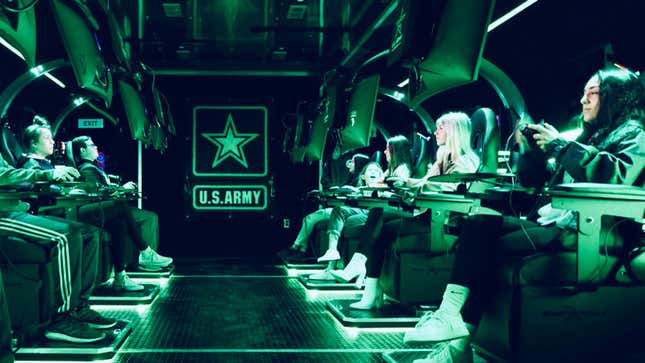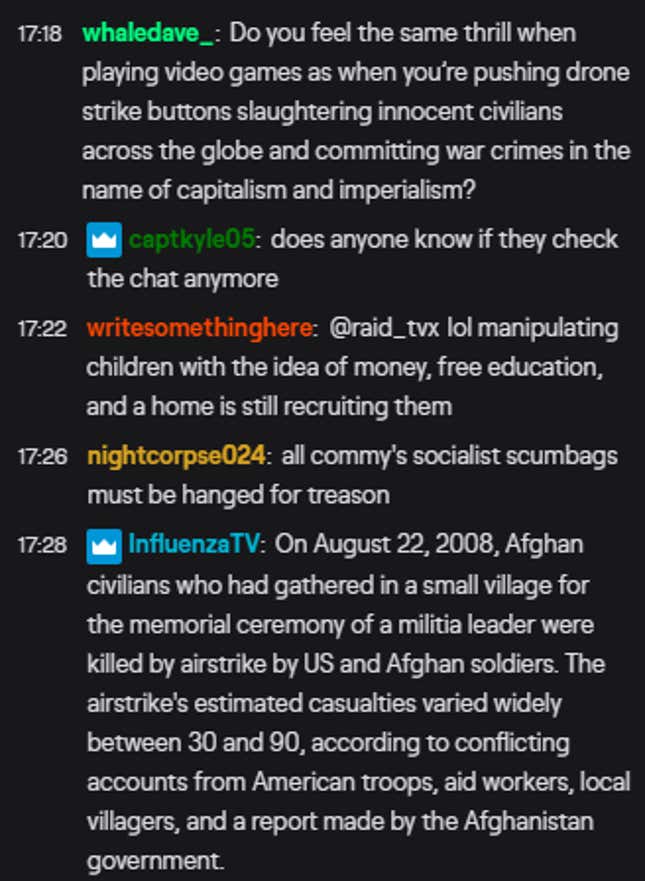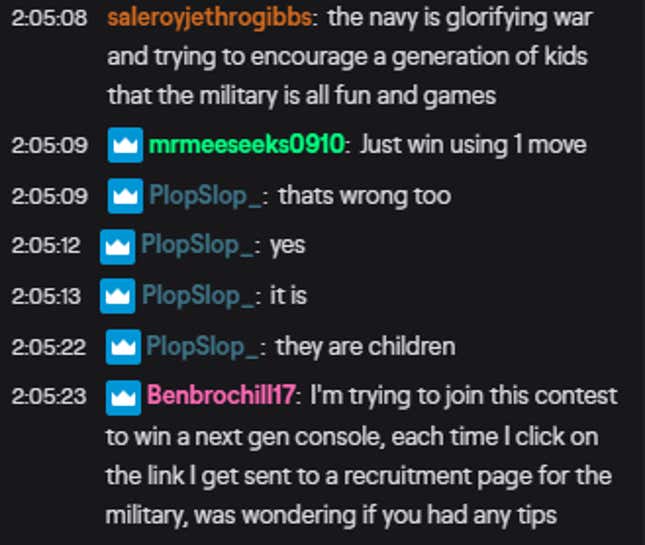
Sam is a 20 year-old college student who says he felt deceived by military recruitment efforts at his own high school. Recently, he found a way to push back. He and dozens of others, spread across a couple of Discords, spend chunks of their day trolling the military on Twitch. They harbor no delusions. They do not believe that branches of the United States military are going to suddenly upend their esports operation and go home. But nearly every night of the week, they still spend hours poking and prodding at the twin bears that are America’s Army and Navy.
The biggest threat to the Army and Navy’s gaming-centric recruitment effort has passed. In July, the Army’s Twitch channel faced widespread scrutiny for banning viewers who asked about war crimes in defiance of the First Amendment, hosting sketchy giveaways that seemed more like baited recruitment hooks, and focusing such efforts on a platform known for attracting young audiences. As a result, Democratic representative Alexandria Ocasio-Cortez introduced a measure that would have forbidden the military from funding such initiatives. It got voted down in the House by 188 Republicans and 103 Democrats.
The Army’s Twitch channel had gone radio silent for more than a month, with a leaked internal communication suggesting that it intended to lick its wounds and regroup possibly in early 2021. However, after Ocasio-Cortez’s measure failed, the Army opted to unban all previously banned viewers and resume streaming in August. The Navy, on the other hand, never stopped streaming. But in the wake of pressure following similar gaffes of its own, it introduced a detailed series of rules and procedures surrounding temporary and permanent bans. For the time being, the Army and Navy’s Twitch channels are here to stay. These days, streams on the Army’s channel tend to attract between 100 and 400 concurrent viewers at any given moment, while the Navy’s viewership sits in the 50-100 range.

If you join either of their respective Twitch chats these days, you’ll find Sam and other people like him equally hunkered down. As members of the military play games in one window, these viewers overwhelm the adjacent chat feeds with questions and facts about war crimes, commentary about propaganda directed at children, information about PTSD and other hardships faced by veterans, and a whole lot of memes (some choice memes: the phrase “World of War Crimes,” asking if a streamer is going to play the new Call of Duty because it will likely contain many war crimes, lengthy processions of emotes alluding to war crimes, etc). These viewers show up day in and day out, and many stick around for the full duration of multi-hour streams nearly every evening. At this point, they do not believe they can force the Army and Navy to pack up and leave, but they do hope they can blunt the sharpest edges of their efforts.
Sam says he was motivated to start trolling Army and Navy streams after Ocasio-Cortez’s measure got left on the House’s cutting room floor.
“The failure of AOC’s bill is what inspired me to take part,” he told Kotaku in DM. “I don’t want some kid buying something falsely advertised to them like I almost did. As for what I want to accomplish, I can’t stop whatever military branch from streaming. But as corny or played-out as it sounds, if I can change one person’s mind about joining, if I can get them to do some research of their own, I’d consider my time spent a success.”
Others who congregate in the Army and Navy’s Twitch chats have their own similar motivations.
“At this point, I think the chances of the streams getting shut down is slim, but I would just like to make their effort to recruit and prey on children as difficult as possible by protesting, asking tough questions, and just generally reminding people in the chat that they’re trying to recruit by glorifying video games,” Timmy, a college freshman who’s responsible for helping organize and publicize one Discord’s efforts to troll and get Navy streamers to fess up to recruitment efforts, told Kotaku in a DM.
“Having your education paid for is nice, but they’re trying their best to get high school students who are worried about loans, like me, to join,” Raven, 17, told Kotaku in a DM. “Now that they can’t come to our schools, they find the next best thing.”
These viewers congregate in a couple different Discords. One belongs to Jordan Uhl, the activist and streamer who originally made waves by publicizing his ban from the Army’s Twitch channel in July, but who told Kotaku that he only pops into the Army’s chat “from time to time” these days. Another Discord, one that’s now more focused on trolling military streams, originally formed around a mutual appreciation for jokes about the streams, but according to a user calling themselves Antifawarrior, it “quickly became bigger than that with people posting screenshots of bans and Twitch clips of [streamers] admitting to recruitment.” It’s currently home to over 20 users, according to Timmy. Now some , like “Bunker Security,” who says they’re a 30 year-old finance professional, coordinate trolling efforts by brainstorming new memes and building off each others’ questions in chat.
“I actually started the Discord that we affectionately call ‘Operation Propaganda,’” Bunker Security said in a DM to Kotaku. “It became clear to me that the trolling wasn’t coordinated and we needed a place to come up with ideas. Trolls always need a bridge.”
Others like Sam, however, say that coordinated troll efforts aren’t all that coordinated, and even when members of the Discord are out in full force, they regularly encounter the occasional unaffiliated but equally critical viewer in chat, suggesting that they are not alone in their opposition to the Army and Navy’s efforts.
These days, the rules are different than they were back when the Army got buried under an avalanche of flak for banning viewers who asked about war crimes. After legal organizations like the ACLU and the Knight Institute vocally opposed what seemed to be First Amendment violations in these Twitch chats, the Army and Navy have issued new rule sets, with both saying that bans would be focused on harassing behavior—not viewpoints—and the latter publishing an eight-page procedure document that details all the steps channel operators must take in order to temporarily or, in rarer cases, permanently ban viewers.
Still, viewers say that the Army and Navy have taken to playing fast and loose with their own rules.
“In the Navy chat, they tend to abuse their spam rules quite a bit,” said Sam. “I’ve seen many times someone who has copy and pasted from an article that describes some war crime perpetrated by the U.S. be immediately removed and for the poster to be temporarily banned for 30 minutes. It can be the first time that has been posted by that user or the first time it was posted in chat in general. When I’ve asked for an explanation for the temp ban, they just say spam.”
“They pick and choose when they want to use their ban policy,” said Antifawarrior. “Like if you say the word ‘spam’ and someone else says it later, they will ban that person for spamming even though it is entirely different people saying the words. They pretty much ban whenever they want and give a fake reason for why they banned you.”
Raven backed up this assessment, adding that temporary bans—known as “timeouts” in Twitch parlance—can range from 30 minutes to 48 hours. According to the Navy’s rules, 48-hour bans are issued for “egregious” behavior, which can include sexually explicit language, advocating for violence, or disclosure of private information. But those who frequent the Navy’s Twitch chat say that they’ve been temporarily banned for otherwise pertinent comments and questions which are then misattributed to tangentially related rule violations.
“I’ve been timed out for asking about a Marine recruiter who sent nude pictures to underage girls and asking if Navy recruiters do that too,” said Timmy. “Timed out for ‘profanity’ with that one.”
The Knight First Amendment Institute at Columbia University, which previously demanded that the Army and Navy stop banning viewers for asking about war crimes, continues to keep an eye on their Twitch channels for potential First Amendment violations.
“Right now, we are monitoring the situation and seeing how they implement these policies,” Katie Fallow, a senior staff attorney at the Knight First Amendment Institute, told Kotaku over the phone. “If people are being banned clearly based on viewpoint, or if these policies are only being applied in a way singling out criticism of the military, we would certainly be interested in hearing that, and we think that would likely be unconstitutional.”
Kotaku reached out to representatives of the U.S. Army and Navy for more information on how both have applied bans since the return of the Army’s stream, but did not receive a response.
However, as a result of public scrutiny and new, more restrictive rules, both channels seem more gun shy about issuing permanent bans, leading to awkward streams in which members of the Army and Navy esports teams either play chicken with their unruly chats or barely acknowledge them at all. After the former approach characterized its big Twitch return in August, the Army once again disappeared from Twitch for more than a week. The Army also sometimes enables slow and emote-only chat modes, which can be good for making larger streams more manageable and building hype, but which mainly serve to stifle discussion in smaller streams.

These stilted efforts fail to play to Twitch’s unique strengths, which has not helped the streams’ popularity. “The Army is trying to figure out what to do, very unsuccessfully,” said Raven. “They take things personally. Not being able to ban us as they did in July isn’t going well for them.”
“I watch a lot of Twitch, and between the absolute lack of interaction and the atrocious game plan, I’m not sure who would be impressed with the Navy and would want to join,” said Bunker Security.
But the U.S. Army and Navy have overwhelming amounts of funding on their side, which they’ve put toward ads on official Twitch Rivals and Call of Duty League esports broadcasts, front page placement for other military Twitch channels like that of the Army National Guard, and apparent collaborations with major video games sites like GameSpot. They also have a long history of normalized military propaganda working in their favor. Meanwhile, many of the people trolling them every day are just kids in a Discord. They’re not getting paid, and they have lives outside this daily online skirmish they’ve found themselves drawn into. You’d think that, at some point, fatigue would set in. To an extent, it has.
“The novelty of the military streams is just not what it used to be,” said Bunker Security. “We basically just break the fourth wall with them at this point because we’re there every night and at times the only people interacting for long periods of time.”
Despite that, Army and Navy Twitch channel dissenters say they’re not going anywhere.
“I don’t see our main group fading out,” said Antifawarrior. “A lot of the people have personal experiences with military and recruitment that keeps them from walking away. Most people who actively stick around do take breaks from everything; it is very mentally taxing.”
“I don’t worry that some are going to get tired of showing up, because I know it’s an inevitability,” said Sam. “I worry about there not being someone else to step up when someone gets tired. I do feel that the effort is growing, if only by a little, which is a relief. And I’d like to add I do feel it is fazing them slightly. Maybe not as an organization, but I’ve noticed some [people] streaming to exhibit some frustration with the chat. Whether it’s the trolls, people voicing real concerns, or a combination of both causing it, I don’t know.”